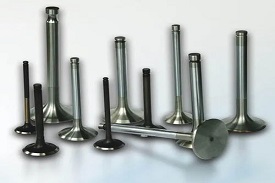
Alloys for internal combustion engine valve applications are meticulously engineered materials designed to withstand the demanding conditions within the engine environment. These alloys generally comprise high-temperature resistant metals such as stainless steel, cobalt-based superalloys, or nickel-based alloys, which offer excellent heat resistance, corrosion resistance, and mechanical properties under extreme temperatures and pressures. The choice of alloy depends on various factors, including the engine type, fuel type, operating conditions, and performance requirements. For example, austenitic stainless steels are commonly used for their excellent corrosion resistance and high-temperature strength in gasoline engines, while cobalt-based superalloys like Inconel are preferred for their exceptional high-temperature strength and oxidation resistance in diesel engines and high-performance racing engines. These alloys undergo precise manufacturing processes such as casting, forging, and heat treatment to achieve the desired mechanical properties, dimensional accuracy, and surface finish, ensuring reliable performance and longevity of engine valves in demanding automotive and industrial applications.
IS 7494:2023 is an important standard for alloys used in internal combustion engine valve applications, ensuring their quality, durability, and performance in critical engine components. This standard outlines the technical specifications and delivery requirements for alloys supplied in the form of round bars and wire rods up to 40 mm in size, which are essential components in the production of engine valves. By setting clear parameters for factors like alloy composition, heat treatment, and surface finish, IS 7494:2023 ensures that alloys meet stringent standards for consistency and suitability in internal combustion engine valves. Compliance with this standard enhances engine valves' reliability and longevity, improves engine efficiency, and reduces emissions. Adherence to IS 7494:2023 promotes regulatory compliance and contributes to the overall competitiveness of engine component manufacturers by ensuring standardized production practices and facilitating market acceptance of alloys for internal combustion engine valve applications.
Note: Obtaining the ISI/BIS Certification is a mandatory requirement for manufacturers of Alloys for Internal Combustion Engine Valve Applications - Specification to sell their products in the Indian market.
Manufacturers must obtain ISI/BIS certification for their Alloys for Internal Combustion Engine Valve Applications - Specification to legally market and sell these products within India. This certification serves as a vital validation of compliance with specific quality and safety standards mandated by the ISI/BIS for the production and distribution of alloys intended for use in internal combustion engine valve applications. Without the ISI/BIS certification, manufacturers face potential legal consequences and hurdles in accessing the Indian market. Securing this certification is not only a regulatory requirement but also a critical step for manufacturers to demonstrate the reliability, compliance, and quality of their alloys for such specialized applications. This certification process underscores the importance of ensuring the integrity and performance of alloys used in internal combustion engines, instilling confidence among stakeholders in the automotive and manufacturing industries regarding its suitability and adherence to Indian standards for usage and distribution.
Indian Standards Institute, or ISI was renamed the Bureau of Indian Standards (BIS) in 1987. The official mark that the Bureau of Indian Standards provides for manufacturers of various goods is the ISI Mark. It is used to indicate compliance with Indian standards (IS) set by the Bureau of Indian Standards (BIS) and has been used as a conformity marking for industrial products. Manufacturers received permission from BIS to use the ISI Mark on items that comply with relevant Indian requirements through the product certification program.
Only manufacturers (domestic or foreign) who produce the finished product will be awarded ISI Certification. This will not be given to any product importers, traders, dealers, or distributors.
The following documentation is required to get an ISI certification:
For more detailed information, please click here.
There are two approaches for Indian manufacturers to become certified with the ISI Mark:
Regular Procedure
With the possible exception of cases deemed "All India first," which might take up to 180 days, the licensing procedure is expected to be finished in 120 days. This timeline starts on the day the application is received, assuming that at different points in time the documentation, unit assessment, and product conformance are all deemed acceptable.
Step 1: Manufacturing Unit Customization in Compliance with Applicable Indian Standards
Step 2: Submission of the Application Form
For more detailed information, please click here.
Simplified Procedure
This is a much faster process than the standard procedure. After a factory inspection is deemed satisfactory and the initial evaluation establishes that the sample complies with the applicable Indian Standard(s), the license application process is expected to be finished in 30 days.
Step 1: Adapting the Manufacturing Unit to Comply with the Relevant Indian Standard
Step 2: Sample Testing
For more detailed information, please click here
The process of obtaining ISI Mark Certification for Foreign Manufacturers typically includes the following steps:
Step 1: Application
Step 2: Query Raised (If Any)
For more detailed information, please click here.
Brand Liaison provides helpful support for achieving ISI Mark Certification. Among our offerings are:
Please click here to get in contact with our team of specialists for a deeper explanation of the paperwork and steps needed to get ISI Mark Certification.